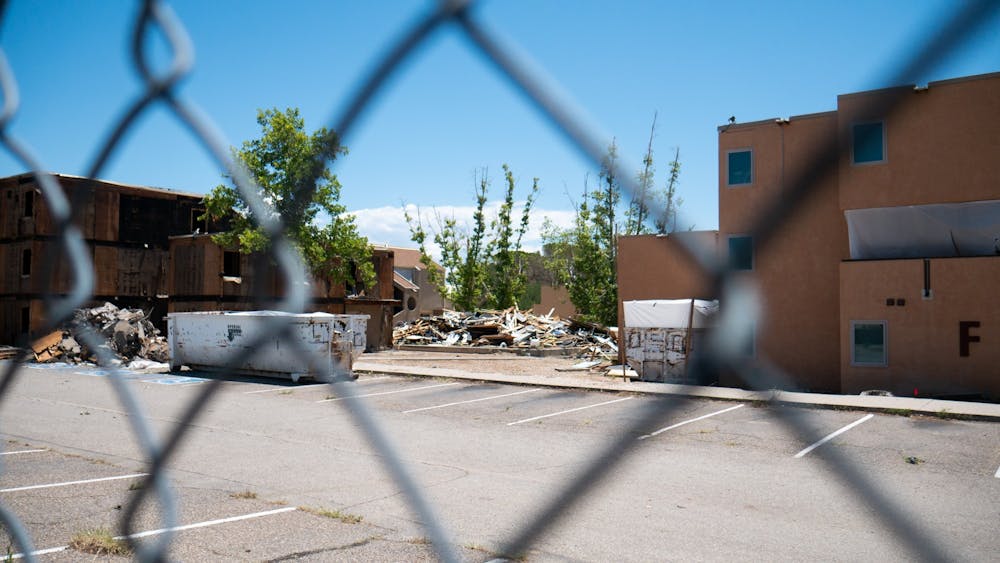The University of New Mexico sold its Student Family Housing apartment complex to Central New Mexico Community College in September 2021 for $1.5 million, leaving limited resources available for student parents at UNM. 26% of students enrolled in universities and colleges across New Mexico are student parents, with 44% being single mothers, according to Emily Wildau, a Research and Policy Analyst for NM Voices for Children.
“There's a constant juggling of time and resources, and there's often a feeling that there's just never enough of me, of my time, of my energy and … material resources to go around. There's always ends that don't meet and needs that aren't met.” Melissa Bendt, a graduate worker, student and parent in the American studies program at UNM, said.
Only 8% of single mothers graduate within six years despite typically having higher GPAs, according to Wildau. She also mentioned the lack of accommodations available to student parents.
“Having spaces for breastfeeding mothers or breastfeeding people to go and just making it clear that like, in a counselor's office, there's like kids books or something, you know — things to really just make them feel like they're supposed to be there,” Wildau said.
Maternity leave itself can also present difficulties for graduate student workers. The Office of Graduate Studies policy provides two weeks of paid medical leave, which only the birthing parent can use during that time; any other leave is conditional depending on the department, according to Alana Block, a graduate worker and United Graduate Workers of UNM organizer.
One student, who wished to remain anonymous, said her department has allowed her the ability to take as much time off after birth as she wished. Her advisor informed her the time taken off would not be considered positively or negatively in her evaluation, but the lack of a strict timeline to return left the student feeling disregarded.
“... That means it'll affect me negatively because, if you don't consider the fact that I had a baby … and make accommodations where you … (are) more flexible with funding, that means you are (affecting me negatively). It's like, it's affecting me if you don't take that into consideration and act like it doesn't happen,” she said.
Because of that, the student only wound up taking four weeks’ leave before returning to work, fearing the perception that her absence meant she wanted to quit or leave. Since then, she has also not had child care and has been on the UNM Children's Campus day care waitlist for about a year. Currently, the UNM Children's Campus waitlist is made up of 40% students — predominantly graduate students, according to UNM spokesperson Cinnamon Blair.
The discrimination faced by student parents is another reason Bendt said she is calling for the University to agree to the United Graduate Workers' nondiscrimination clause, citing that the education system itself is built on colonialist, racist ideals made by and for men.
“The University refuses nondiscrimination language in the contract, which of course hurts parents and particularly mothers and women of color, specifically. Rather than offering institutional supports against discrimination, they're actively fighting to maintain policies that can intentionally hurt student parents,” Bendt said.
The stigma around being a student parent also has a negative effect, according to Bendt. She described a few negative experiences with peers over being a student parent, like receiving side-eyes from peers when having to leave class to care for her kid, the difficulties group projects present and a feeling of general isolation, along with the toll it takes on her child.
“It's hard on kids to, you know, get dragged to evening classes … Evening child care can be particularly expensive. (It) means that then, kids can't participate in regular kid activities. When kids see that there isn't flexibility for their parents, then they start to question the value of education,” Bendt said.
Get content from The Daily Lobo delivered to your inbox
Finding adequate housing can also present tremendous roadblocks for student parents. At many universities, students with children are not allowed to live in dormitories, which can present unique challenges, like satisfying a freshman residency requirement, according to Wildau. Bendt wishes there were more university family housing options.
“I think having more options and also having an understanding that, for students who have children and families, a one-bedroom or a studio apartment is already expensive, and you can't fit a family in a studio apartment,” Bendt said.
Heightened expenses also come from adding dependents to the Student Health Plan, which costs anywhere from $880 to $2,053 depending on the time of year. The accumulation of all of the expenses can lead to student parents dropping out.
“A lot of times, if you have a student who’s a parent, or even just really low-income students, if a car breaks down or their laptop gets stolen, that's when they will drop out of school because that extra expense is just too much. They have to make other decisions to recover from that,” Wildau said.
Wildau said universities could provide more services for students on campus and encourage a more welcoming environment on campus for families by including flexible office hours and degree plans that may better fit their schedules.
The importance of education and support for student parents is something that Bendt said is quintessential to the community.
“When student parents are left out of education, it also impacts the wider community in terms of people not having access to education and to gaining skills,” Bendt said.
Madeline Pukite is the managing editor at The Daily Lobo. They can be contacted at news@dailylobo.com or on Twitter @maddogpukite






